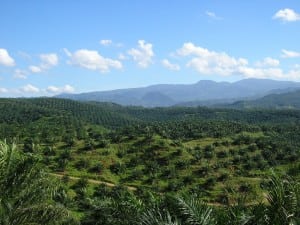MIRI: The state’s crude palm oil (CPO) could further establish its presence in the global halal market through shariah-compliant certification.
Assistant Minister in Chief Minister’s Office (Bumiputera Entrepreneurs Development) Datuk Mohd Naroden Majais noted that there had been an encouraging growth in global demand for halal-certified products including food and drinks, in view of their shariah-compliant methods of preparation that emphasise on hygiene and non-incorporation of ‘haram’ (forbidden) items.
“Halal certification ensures that any product is clean and safe throughout, beginning from processing methods down to distribution and marketing. This means that consumers can use or consume these products without fear.
“In this respect, CPO can command a higher share in the world’s halal market. At present, India is the largest importer of  CPO from Sarawak,” he said after officiating at a seminar on ‘Halal Certification for Operators of Oil Palm Mills in Sarawak’ at a hotel here yesterday, where director of Entrepreneurs Development and Halal Industry Unit under Chief Minister’s Office, Samat Juna and Malaysian Palm Oil Board (MPOB) head of certification Mohd Mukmin Bohari were also present.
CPO from Sarawak,” he said after officiating at a seminar on ‘Halal Certification for Operators of Oil Palm Mills in Sarawak’ at a hotel here yesterday, where director of Entrepreneurs Development and Halal Industry Unit under Chief Minister’s Office, Samat Juna and Malaysian Palm Oil Board (MPOB) head of certification Mohd Mukmin Bohari were also present.
Naroden further highlighted the positive growth in the Malaysian halal industry, which recorded an export value of RM37.7 billion last year.
“This represented an increase of 14.8 per cent over RM32.8 billion recorded in 2013. It is also worth noting that China is by far the biggest importer of Malaysian halal products, with trade value amounting to RM4.6 billion in 2014.
“This proves that the global demand for halal products is increasing every year,” he said.
On the seminar, Naroden said it was aimed at encouraging local oil palm players to go for halal certification.
The programme was initiated by the state government through the Entrepreneurs Development and Halal Industry Unit, with collaboration with MPOB and other relevant agencies.
“The halal concept goes beyond preparation of food. It also covers the manufacturing process of non-food products. What we (state government) strive to do is for Sarawak CPO and oil palm players to engage in the big global halal market.
“To my understanding, 75 per cent those applying for and receiving approved halal certificates for their operations in Sarawak are actually non-Muslim. Outside here, New Zealand, Australia and several European countries are focusing on halal products as they know that they can gain wider market share by supplying their offerings to Muslim countries,” said Naroden.



